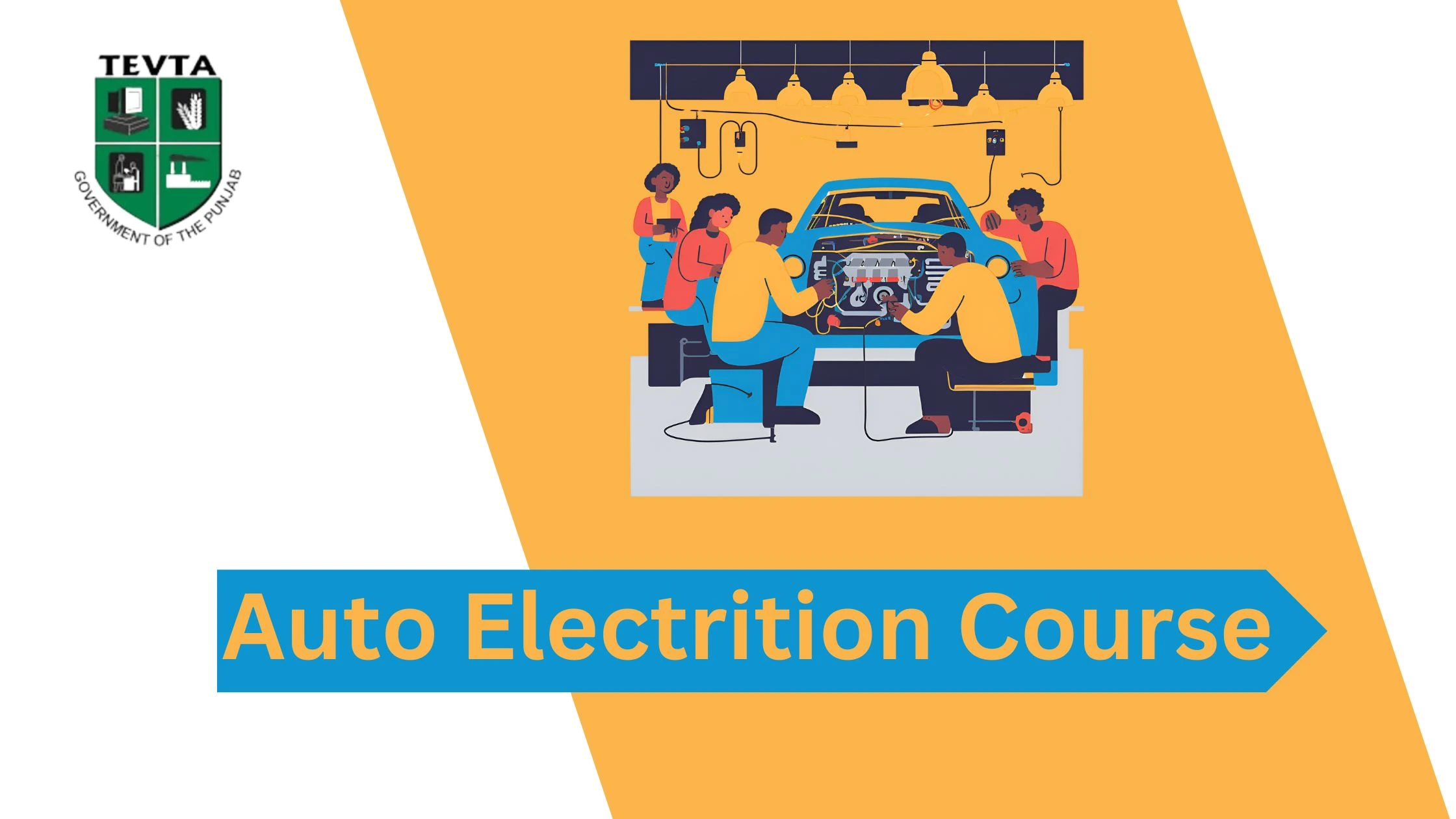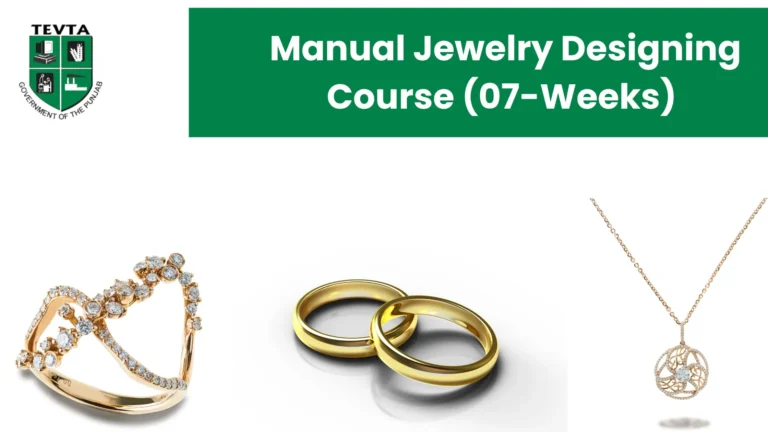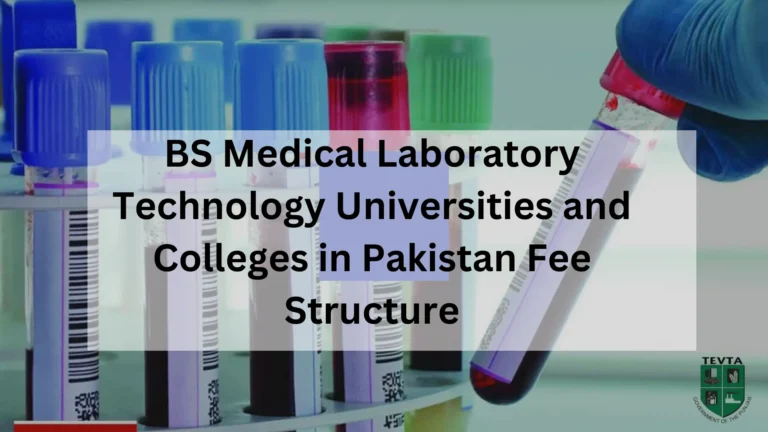Auto Electrition Course
Auto Electrition Course 2025 is offered by tevta courses. Automotive technology is rapidly changing from mechanical to electronic to analog to digital, and from car bread to electronic fuel injectors due to competition and pressure to develop more efficient and economical vehicle systems that significantly Control toxic emissions are being followed.
Due to the increasing number of vehicles on the road and high-tech changes, especially hybrid vehicles, advanced electronic ignition systems, and various drive assist programs, the demand for trained auto electricians is increasing.
The future will require qualified and organized individuals who can diagnose and remedy problems. and ethical values, which enable graduates to meet the demands of the job market.
Details About Auto Electrition Course 2025
- Entry Level: Middle
- Duration of Course: 6 – Months
- Total Training Hours: 800 Contact Hours
- Training Methodology: Practical 80%, Theory 20%
- Instructional Media: Urdu / English
Also see: Course Offering kfupm 2024
56 Institutions are offering CERT Auto Electrician in Pakistan
| Institute | City | Degree, Duration | Fee | Deadline |
|---|---|---|---|---|
| 1. Shaheed Benazir Bhutto Dewan University | Karachi | CERT , Months | 0 | 28-08-2021 |
| 2. Vocational Training Institute | Ath Muqam | CERT , 6 Months | 0 | 30-09-2020 |
| 3. Vocational Training Institute | Bagh | CERT , 6 Months | 0 | 30-09-2020 |
| 4. Government Polytechnic Institute, Dogra | Bara | CERT , Months | 0 | 28-02-2021 |
| 5. Government Technical Training Centre [daultala] | Gujar Khan | DIP , 1 Years | 30-11–0001 | |
| 6. Government College Of Technology | Kohat | CERT , 4 Month | 0 | 29-01-2023 |
| 7. Vocational Training Institute | Kotli | CERT , 6 Months | 0 | 30-09-2020 |
| 8. Vocational Training Institute | Mir Pur (ajk) | CERT , 6 Months | 0 | 30-09-2020 |
| 9. Vocational Training Institute | Muzaffarabad | CERT , 6 Months | 0 | 30-09-2020 |
| 10. Balochistan Institute Of Technical Education | Quetta | CERT , 6 Months | 0 | 31-03-2019 |
| 11. Vocational Training Institute | Rawala Kot | CERT , 6 Months | 0 | 30-09-2020 |
| 12. Pak-swiss Technical Training College | Mingora | DIP , 3 Months | 0 | 26-12-2015 |
| 13. Government Technical Training Institute, Arifwala Road | Bahawal Nagar | CERT , 6 Months | 0 | 26-08-2014 |
| 14. Government Technical Training Institute (m) | Bhalwal | CERT , Months | 0 | 08-01-2018 |
| 15. Government Technical & Vocational Centre (m) | Charsadda | CERT , 6 Months | 0 | 15-04-2019 |
| 16. Government Technical Training Institute | Chichawatni | CERT , 3 Months | 30-11–0001 | |
| 17. Government Technical Training Centre, Near Circuit House | D.g.khan | CERT , 6 Months | 30-11–0001 | |
| 18. Applied Technologies Institutes | Dina | CERT , 3 Months | 0 | 08-04-2023 |
| 19. Agricultural Machinery Training School | Faisalabad | DIP , 1 Years | 30-11–0001 | |
| 20. Government Apprenticeship Training Centre | Faisalabad | DIP , 1 Years | 0 | 14-05-2022 |
SKILL PROFICIENCY DETAILS
After completing this Auto Electrician course 2025 in pakistan, the trainees are able to:
- Effectively use auto electrician workshop tools and equipment.
- Perform simple auto electrician shop techniques such as wiring in series and parallel circuits, making testers, jumper wires, soldering, tapping, and connecting thimbles.
- Perform maintenance, charging, and testing of batteries.
- Diagnose and service self-starters.
- Diagnose and service the charging system.
- Interpret vehicle wiring diagrams.
- Wire electrical circuits.
- Apply diagnostic flowchart diagrams properly.
KNOWLEDGE PROFICIENCY DETAILS For Auto Electrition Course 2025
Upon successful completion of this TEVTA Auto Electrician course, the trainee should be able to understand:
- Basics of auto electrician.
- Usage of workshop tools.
- Function and operation of batteries.
- Construction and operation of self-starters.
- Construction and operation of the charging system.
- Construction and operation of the ignition system.
- Different circuits are used in car wiring.
- The operation of EFI electronics.
- Air-conditioning systems in vehicles.
- Diagnosing gasoline vehicles using digital scanners.
- Various electrical components, their location, operation, and function.
SCHEME OF STUDIES For Auto Electrition Course 2025
Auto Electrician (6 – Months Course)
| S. No. | Main Topics | Theory Hours | Practical Hours | Total Hours |
| 1 | Introduction to Auto electrician basics | 51 | 90 | 141 |
| 2 | Starting System of vehicle | 13 | 80 | 93 |
| 3 | Charging System of Vehicle | 16 | 63 | 79 |
| 4 | The ignition system of the vehicle | 20 | 90 | 110 |
| 5 | Wiring circuits and accessories | 18 | 91 | 121 |
| 6 | Vehicle air conditioning and heating system | 12 | 80 | 92 |
| 7 | Hybrid & Electric Vehicle | 6 | 50 | 56 |
| 8 | I.T Fundamentals | 8 | 32 | 40 |
| 9 | Functional English | 16 | 64 | 80 |
| Total | 160 | 640 | 800 |
Also see: NAVTTC Courses
DETAIL OF COURSE CONTENTS For Auto Electrition Course 2025
Auto Electrician (6 – Months Course)
1. Introduction to Auto electrician basics
Theory Hours: 51
Practical Hours: 90
1.1 Safety Precautions: General and in an auto electrician shop, firefighting, first aid, environmental protection, reasons for workshop accidents, possible causes of accidents, and safety precautions.
1.2 Introduction to hand tools and equipment used in auto electricians.
1.3 Measuring tools (vernier caliper, feeler gauge).
1.4 Introduction to automotive four-stroke engine.
1.5 Basic electricity (atomic structure of matter and electricity).
1.6 Conductor, insulator, semiconductor.
1.7 Current, voltage, and resistance.
1.8 Ohm’s law.
1.9 Symbols used in electrical wiring.
1.10 Series and parallel circuits.
1.11 Electric circuit problems.
1.12 Magnet, magnetism, and electromagnet.
1.13 Relays, solenoid, printed circuits, circuit breaker, fuse, types of bulbs, terminals, and switches.
1.14 Diodes and transistors.
1.15 PNP and NPN type semiconductors.
1.16 Thermistor.
1.17 Logic gates.
1.18 Sensors and actuators.
1.19 Purpose, construction, and types of battery.
1.20 Charging and discharging of battery.
1.21 Battery rating.
Practical: Use of fire extinguisher, measurement with a vernier caliper and wire gauge, soldering (eye joint, lap joint, T joint), use of a multimeter, crimp connecting, making test lamp, studying characteristics of magnets, interpreting wiring diagrams and color coding, making series and parallel circuits, checking fuse, switch, diode, and transistor, preparing full-wave rectifier, making different logic gate circuits, checking different ICs, identifying parts of a four-stroke engine, identifying battery parts, cleaning and topping up, checking specific gravity, battery charging, preparation of electrolyte, light load test, troubleshooting (undercharging and overcharging).
2. Starting System of Vehicle
Theory Hours: 13
Practical Hours: 80
2.1 Purpose, principle, and construction of the starter motor.
2.2 Operation of solenoid switch and motor.
2.3 Neutral safety switch.
Practical: Wiring up the starting circuit, dismantling, checking the starter motor, and starter motor components, assembling, performance checking, troubleshooting their possible causes, and remedies of the starting system.
3. Charging System of Vehicle
Theory Hours: 16
Practical Hours: 63
3.1 Purpose, circuit diagram, and function of charging systems.
3.2 Function, construction, and operation of the alternator.
3.3 Construction and operation of the double-point voltage regulator.
3.4 Electronic regulators.
Practical: Wiring up the charging circuit on the wiring board, charging system inspection and diagnosing, adjusting alternator belt tension, dismantling, checking and inspection, assembling the alternator, checking the output of the alternator, replacing the carbon brush, troubleshooting their possible causes, and remedies of charging system.
4. Ignition System of Vehicle
Theory Hours: 20
Practical Hours: 90
4.1 Purpose and types of ignition system.
4.2 Construction of conventional ignition system (Ignition switch, Ignition coil, Distributor, Spark plug and its types).
4.3 Capacitor discharge ignition.
4.4 Pickup coil type ignition.
4.5 Multiple coil and distributor-less ignition.
4.6 Firing order.
4.7 Ignition timing.
Practical: Wiring of conventional ignition system, replacing C.B points, setting ignition timing, use of timing light, checking of ignition system components such as ignition coil, condenser advance mechanism, servicing of the spark plug, checking and wiring up CDI system components, troubleshooting their possible causes, and remedies of the ignition system.
5. Wiring Circuits and Accessories
Theory Hours: 18
Practical Hours: 91
5.1 Purpose and construction of horn circuit, headlamps circuit, and other lights.
5.2 Windshield wipers/washers circuit.
5.3 Power windows.
5.4 Electric power steering.
5.5 Instrument panel gauges, meters, indicators.
5.6 Introduction to EFI system components (Sensors, ECM & Actuators).
5.7 Introduction to Electronic Engine Controls.
Practical: Wiring up the headlamp circuit, replacing fuses, switches, and bulbs, headlamp aiming, wiring up the parking light circuit, wiring up the indicator circuit and hazard warning circuit, wiring up the brake and backup light circuit, wiring up the door and roof light circuit, wiring up horn circuit, wiring up windshield wiper and washer circuit, glow plug circuit and checking, wiring up gauge circuits (Fuel, Temperature, oil pressure), parts identification and finding the resistance of EFI components, removing and refitting of different sensors and valves used in EFI system, dismantling, servicing and reassembling different sensors and valves of EFI system, removing, servicing and refitting EFI fuel feed pump, fault diagnosing in EFI system of different vehicles.
6. Vehicle Air Conditioning and Heating System
Theory Hours: 12
Practical Hours: 80
6.1 Ventilating, heating, dehumidifying, and defrosting functions of the vehicle.
6.2 Components and working principle of air conditioner (AC).
6.3 The thermostat switch and compressor clutch of AC are working.
6.4 Gas charging of compressor.
6.5 Automatic temperature control.
6.6 Troubleshooting its possible causes and remedies of heating system.
6.7 Troubleshooting the possible causes and remedies of the air conditioner.
Practical: Removing, inspecting, and installation of AC compressor, servicing of air conditioner, gas charging of
compressor, performance testing of air conditioner, dismantling, and inspecting of compressor, inspecting and wiring up of AC circuit components, troubleshooting its possible causes, and remedies of air conditioner.
7. Hybrid & Electric Vehicle
Theory Hours: 6
Practical Hours: 50
7.1 Basics of Hybrid Vehicle, types, construction, and working principle of HEV (Hybrid Electric Vehicle).
7.2 Hybrid electric vehicle (HEV) components and their function.
7.3 Battery management system (BMS), and motor control unit (MCU).
Practical: Identification of hybrid vehicle components, wiring up of hybrid vehicle components on a wiring board, wiring up of traction battery pack components and circuits, checking of traction battery pack output, wiring up of motor control unit components and circuits, fault diagnosing of hybrid vehicle components.
8. I.T Fundamentals
Theory Hours: 8
Practical Hours: 32
8.1 Basics of computer.
8.2 Computer hardware and software.
8.3 Introduction to operating systems.
8.4 Basic knowledge of the Internet.
8.5 Basic knowledge of Microsoft Office.
8.6 Email and social media handling.
8.7 Troubleshooting of computer systems.
Practical: Operating system installation, hardware installation, Microsoft Office installation and usage, creating an email account and handling, creating a social media account and handling, browsing the internet for relevant information, troubleshooting of computer systems.
9. Functional English
Theory Hours: 16
Practical Hours: 64
9.1 Basic grammar.
9.2 Sentence structure.
9.3 Paragraph writing.
9.4 Letter writing.
9.5 Comprehension.
9.6 Conversation practice.
9.7 English for workplace.
Practical: Conversation practice, paragraph writing practice, letter writing practice, comprehension exercises, workplace English practice.
Contact Information
ACADEMICS DEPARTMENT
96-H, GULBERG-II, LAHORE
Ph # 042-99263055-9, 99263064
gm.acad@tevta.gop.pk, manager.cur@tevta.gop.pk







